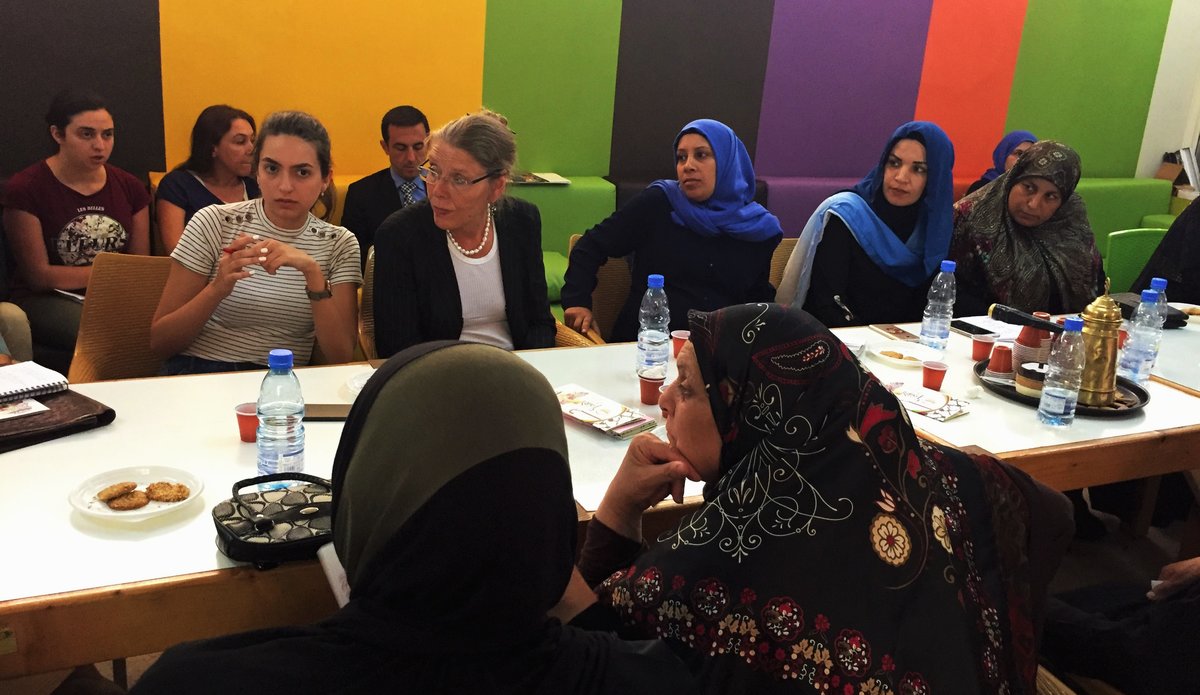Faith in Education and the Future Keeps Hope High in Rashidieh Camp
UNSCOL Staff
With ululations and applause, a group of Palestine refugee women interrupted a discussion they were having with Acting UN Special Coordinator for Lebanon Pernille Kardel in the refugee camp of Rashidieh in south Lebanon. They had just received news that the 18-year old son of Fidaa, one of their women’s club members, had passed the official Baccalaureate examination. It was a moment of pride for all as Fidaa wiped tears of joy from her eyes. “Now we have to worry about how to cover the fees for his university education,” Fidaa said returning to her reality. The meeting with the Special Coordinator was an opportunity for them to recount some of the difficulties they face as women who were born and lived their entire lives in a refugee camp. They all spoke of the difficult socio-economic situation with over 70% percent of camp residents living in poverty. Some said traditions and customs weigh down more on women in their patriarchal societies and others lamented the rise in child marriages in the camp. “It is so important for women like all of you to join together to voice their opinions and to contribute to the welfare of your society,” the Special Coordinator said.
The women were meeting at a center called Sanabel set up by UNRWA to offer psychosocial and recreational support for the elderly. Elderly men regularly gather in front of the center, sipping coffee, some playing cards and backgammon. All the women spoke of the importance of education for both girls and boys. They also spoke of the importance of protecting youth from armed groups and from the proliferation of drugs. “We don’t feel safe letting our children go to a café anymore because of the risk they might be targeted by drug dealers,” one of the mothers said.
Fidaa’s son was the first of her five children to get a school degree. He studied at one of four schools run by the UN Relief and Works Agency (UNRWA) in the Rashidieh camp free of charge. But with the financial problems UNRWA is facing, many Palestine refugees fear the schooling offered to refugees may be impacted. “They say if you open a school, you close a prison. Let’s not close a school and open a prison,” a member of Rashidieh’s popular committee told the Special Coordinator in a separate meeting. UNRWA has reassured the residents that it will do everything possible to keep the schools open although the situation is critical. Camp residents fear that dwindling UNRWA resources could impact other services as well such as health and shelter coverage or even, more important, the longer-term goal of their right to return to their homeland. “UNRWA is facing financial difficulties but the UN is trying to stay united and addressing this issue remains a priority for the UN at the highest levels,” the Special Coordinator said.
While education is highlighted by many in the camp as a priority, concern over school drop outs in Rashidieh and other Palestinian camps is rising. “The financial situation is forcing many youth to drop out of school to work and help their parents with household income,” Mahmoud, a 17-year old student said. Others complete their education but cannot easily find job opportunities or jobs in their field of specialization. Qamar a 19-year old studying translation in university said her only option after graduation would be to teach English in the camp. She explained that 39 professions, particularly those with syndicate membership, were off limits to Palestine refugees in Lebanon. But despite the constraints, hope in the future remains. Marwa, a 16-year old student, who wants to study law said she sent a video to the UN Security Council in New York to explain about the plight of Palestine refugees and to seek international support. And when Fidaa’s son passed the Baccaulerate exam, his family and relatives lit fireworks to celebrate. “Don’t worry, these are not gunshots. These are fireworks,” camp residents told the visiting UN delegation.
Rashidieh is one of 12 Palestine refugee camps in Lebanon, most of them established since the displacement of Palestinians to Lebanon in 1948. Some 34 thousand Palestine refugees are registered in Rashidieh but a much smaller number reside there, mainly due to immigration, mostly illegal, of many camp residents seeking opportunities abroad.
 UN
UN





